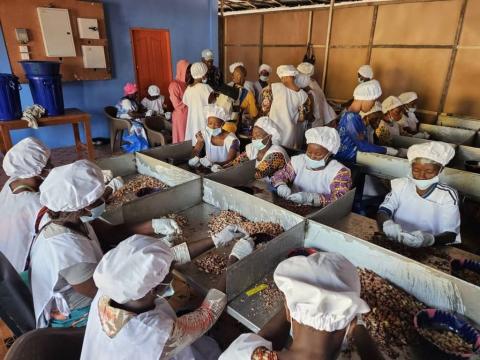By Nasratu Kargbo
It was all smiles, laughter, and joy on the faces of women who are part of the Waterloo Cashew Processors and Sellers Association as they expressed excitement over the establishment of the processing factory, describing it as the end of an era of suffering for them in the Cashew nut industry.
Speaking with Politico on the 26th of March 2024 on the margins of a ceremony held to commission the factory at Newton outside Freetown, Susan Conteh who works at the nut cracking section said they have been liberated from the arduous task they faced in the past.
Highlighting some of the challenges, Conteh who said she is an asthma patient recalled how they had to roast the cashew for themselves in extreme fire, which led her to stop partaking in that part of production due to the impact of the smoke on her health.
She had to resort to paying someone else to handle the roasting but she realised far less proceeds at the end as they would steal the cashew.
Conteh added that before the modern factory, they used stones to crack open the cashew nut, and in the process the watery discharge from the cashew caused sores on their skin, making it difficult for them to do their chores.
“We are happy, these machines will prevent us from all these struggles and health hazards that come with local cashew production,” she said.
Ramatu Kargbo who is part of the peeling and packaging section said her daughter also works there, and together they have used monies earned, to support the family.
She expressed delight at the introduction of the modern method of roasting the nuts, unlike in the past that caused fires in houses.
One of the nutcrackers Alhaji Koroma said the factory has not only been helpful to women but also some of the men crackers helping the women.
He explained that the job is a source of income for him and his family, especially with high unemployment in the country.
Responding to the question on the quantity of Cashew they crack per day, Koroma explained that they do not have a specific number. He explained that the amount varies, noting that they crack, process, and sell as a factory, but that aside from theirs, other people also bring their cashews to them for them to provide cracking services. He said the monies paid for the services they offer go to the management of the factory.
In the cracking room are fifteen machines, with men wearing protective gloves and face masks whilst doing their job. He said before now the processes the cashew nut went through were not hygienic enough and were hazardous to them.
Koroma said: “They have made it easier for us to crack and this will not affect us like the manual system, because we all have protective gears”.
The women are divided into five groups with each group producing their cashew nuts and placing them in impressive–looking packages with their name boldly printed. Join Hand Group, Tawopaneh, Together We Achieve, Concern Group, and Waterloo Women’s Cashew Processing Factory (WWCPF) are the five groups operating in the factory.
Five Tricycles and two motorbikes were given to the women in a bid to facilitate their movement. The factory has provided jobs for over three hundred Sierra Leoneans, the majority being women. The project is sponsored by the European Union through the implementing partners Solidaridad and Cotton Tree Foundation.
Copyright © 2024 Politico (28/03/24)








